计算机其它_Collaboration network in science of networks(网络科学领域科学家合作关系)
2023年四级真题及答案 (2)

2023年四级真题及答案简介2023年的英语四级考试是中国大陆普通高校的全国统一考试,考察学生在听力、阅读、写作和翻译等方面的能力。
本文将为大家提供2023年四级真题及答案,帮助大家更好地准备考试。
听力部分(共30分)第一节(共5小题)1. A. They are already living together.2. B. The man is not willing to move out.3. C. The woman hates crowded places.4. A. The man will try to find another place.5. C. The woman would like to keep the apartment.第二节(共10小题)6. B. They have a lot of demands for space.7. A. It has a good management team.8. B. It offers a variety of activities.9. C. The woman should join the club.10.B. Limited by bad weather conditions.11.C. Study the snowflake carefully.12.A. They have complex shapes.13.C. They have different crystal patterns.14.A. Their branches grow slowly.15.B. It regulates blood sugar levels.第三节(共5小题)16.C. The woman should wait for some time.17.C. Advertising on the Internet may not be effective.18.A. It is highly competitive.19.B. It is important to have good advertising strategies.20.A. Both are important for a successful advertising campaign.第四节(共10小题)21.B. She saw a man riding a bike.22.C. She saw a bike racing event.23.B. It can be quite risky.24.A. It saves money on transportation.25.C. The man doesn’t mind taking risks.26.B. Go for a bus ride.27.A. She is too tired to talk to the man.28.C. The man is unfamiliar with the city.29.A. Get off the bus.30.B. Continue riding in the same direction.阅读部分(共50分)第一篇(共10小题)31.D. The importance of artificial intelligence32.C. Information overload33.B. They will be limited and localized34.D. The benefits of collaboration35.A. Provide support and assistance 第二篇(共7小题)36.A. strictness37.B. structure38.C. responsibility39.A. education40.B. the importance of sports第三篇(共11小题)41.C. It’s good for the environment42.D. It will bring new opportunities43.D. The economic potential44.C. It will lead to job cuts45.A. global connectivity第四篇(共7小题)46.A. people’s preferences47.C. the involvement of technology48.B. save time and effort49.D. the opportunities for improvement50.B. the importance of customer experience第五篇(共15小题)51.B. The problem with too many meetings52.D. Disrupting work schedules53.A. Set clear objectives54.C. Find alternatives to meetings55.D. Reducing the number of participants56.C. Preventing interruptions57.A. Avoid scheduling meetings during prime working hours58.B. Keep meetings short and focused59.D. Encourage virtual meetings60.A. Promote effective communication写作部分(共30分)作文题目:电子书与纸质书电子书相比传统纸质书在当今社会已经成为一种趋势。
计算机科学的研究领域和前沿技术

计算机科学的研究领域和前沿技术计算机科学作为一门跨学科的科学领域,涵盖了众多研究领域和前沿技术,在当前信息时代扮演着举足轻重的角色。
本文将介绍计算机科学的主要研究领域以及一些正在前沿发展的技术。
一、人工智能人工智能(Artificial Intelligence,AI)是计算机科学中的重要研究领域之一。
它涉及使计算机具备类似人类智能的能力。
在人工智能领域,研究人员关注的重点包括机器学习(Machine Learning)、深度学习(Deep Learning)、自然语言处理(Natural Language Processing)和机器视觉(Computer Vision)等。
这些技术对于构建智能系统、自动化决策以及人机交互方面具有重要意义。
二、数据科学和大数据随着互联网的发展和智能设备的普及,大量数据被产生、存储和传输。
数据科学和大数据领域致力于有效地处理、分析和利用这些数据。
数据科学结合了统计学、数学和机器学习等领域的知识,旨在从数据中提取有用的信息和模式。
大数据技术则专注于处理和管理大规模数据集,包括数据存储、数据挖掘和数据可视化等方面的技术。
三、网络与信息安全随着信息技术的不断发展,网络与信息安全成为计算机科学中一个重要的研究领域。
网络安全关注防止网络系统和数据的非法访问、攻击和破坏。
信息安全涉及到保护敏感信息的机密性、完整性和可用性等方面的研究。
在这个领域中,密码学、安全协议和网络攻击防护等都是研究的关键点。
四、人机交互人机交互是计算机科学与心理学、设计学等学科的交叉领域。
它研究如何改进人与计算机之间的交互方式和用户体验。
人机交互领域的研究内容包括用户界面设计、虚拟现实、增强现实以及智能可穿戴设备等。
随着移动设备和智能家居的普及,优化人机交互方式对于提升用户体验具有重要意义。
五、量子计算量子计算是计算机科学中备受关注的前沿技术之一。
传统计算机使用二进制位(比特)进行计算,而量子计算机则利用量子位(量子比特),即量子叠加和纠缠的概念,可以在特定情况下实现并行计算的优势。
英语作文计算机专业的重要性和用途
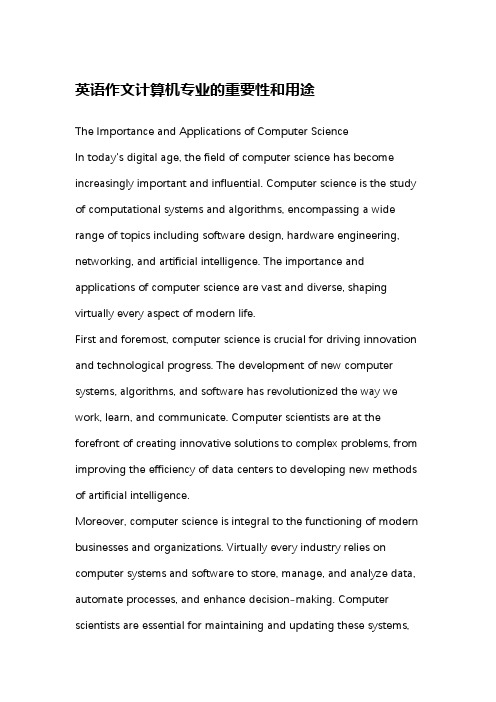
英语作文计算机专业的重要性和用途The Importance and Applications of Computer ScienceIn today's digital age, the field of computer science has become increasingly important and influential. Computer science is the study of computational systems and algorithms, encompassing a wide range of topics including software design, hardware engineering, networking, and artificial intelligence. The importance and applications of computer science are vast and diverse, shaping virtually every aspect of modern life.First and foremost, computer science is crucial for driving innovation and technological progress. The development of new computer systems, algorithms, and software has revolutionized the way we work, learn, and communicate. Computer scientists are at the forefront of creating innovative solutions to complex problems, from improving the efficiency of data centers to developing new methods of artificial intelligence.Moreover, computer science is integral to the functioning of modern businesses and organizations. Virtually every industry relies on computer systems and software to store, manage, and analyze data, automate processes, and enhance decision-making. Computer scientists are essential for maintaining and updating these systems,ensuring their security and reliability.In addition, computer science has a significant impact on society and culture. The widespread use of computers and the internet has transformed the way we access and share information, connect with others, and express ourselves. Computer scientists play a crucial role in shaping these digital spaces, developing new platforms and tools that facilitate communication and collaboration.Furthermore, the field of computer science offers numerous career opportunities. As the demand for technological solutions continues to grow, the need for skilled computer scientists is also increasing. Computer science professionals can find employment in a wide range of industries, including technology, healthcare, finance, and government.In conclusion, the importance and applications of computer science are vast and diverse. It is a critical field that drives innovation, powers modern businesses, shapes society and culture, and offers numerous career opportunities. As technology continues to evolve and become more integral to our lives, the role of computer science will become even more significant.。
智慧协同网络及应用英文
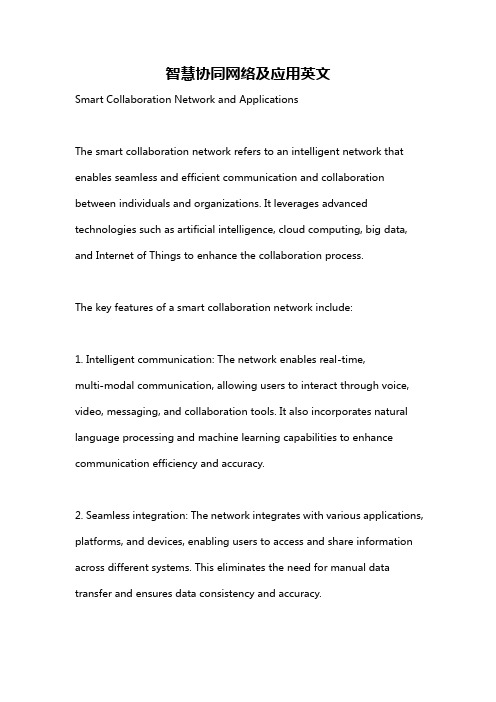
智慧协同网络及应用英文Smart Collaboration Network and ApplicationsThe smart collaboration network refers to an intelligent network that enables seamless and efficient communication and collaboration between individuals and organizations. It leverages advanced technologies such as artificial intelligence, cloud computing, big data, and Internet of Things to enhance the collaboration process.The key features of a smart collaboration network include:1. Intelligent communication: The network enables real-time,multi-modal communication, allowing users to interact through voice, video, messaging, and collaboration tools. It also incorporates natural language processing and machine learning capabilities to enhance communication efficiency and accuracy.2. Seamless integration: The network integrates with various applications, platforms, and devices, enabling users to access and share information across different systems. This eliminates the need for manual data transfer and ensures data consistency and accuracy.3. Advanced collaboration tools: The network provides a wide range of collaboration tools such as document sharing, virtual whiteboarding, task management, and video conferencing, enabling teams to work together efficiently regardless of location or time zone.4. Intelligent analytics: The network collects and analyzes data from various sources, providing valuable insights for decision making, resource allocation, and performance evaluation. It enables users to track and measure collaboration effectiveness and identify areas for improvement.5. Secure and scalable infrastructure: The network ensures data security and user privacy through advanced encryption and authentication mechanisms. It also supports scalability to accommodate the growing number of users and data volumes.Applications of smart collaboration network include:1. Remote work: With the increasing trend of remote work, smart collaboration networks enable teams to collaborate effectively from different locations. It provides a virtual workspace where team members can communicate, share files, and collaborate on projects in real-time.2. Supply chain management: Smart collaboration networks optimize supply chain operations by facilitating real-time communication and collaboration between suppliers, manufacturers, distributors, and retailers. It helps streamline processes, reduce costs, and improve overall efficiency.3. Healthcare: In the healthcare sector, smart collaboration networks enable healthcare professionals to securely exchange patient information, collaborate on treatment plans, and access medical knowledge databases. It improves care coordination, reduces medical errors, and enhances patient outcomes.4. Smart cities: Smart collaboration networks play a crucial role in connecting various stakeholders in a smart city ecosystem, including government agencies, citizens, and businesses. It enables efficient communication, collaboration, and data sharing for better urban planning, resource management, and public services.In conclusion, the smart collaboration network and its applications revolutionize the way individuals and organizations collaborate andcommunicate. It enhances productivity, efficiency, and innovation while enabling seamless connectivity and collaboration in various domains.。
有关计算机课程的英语作文
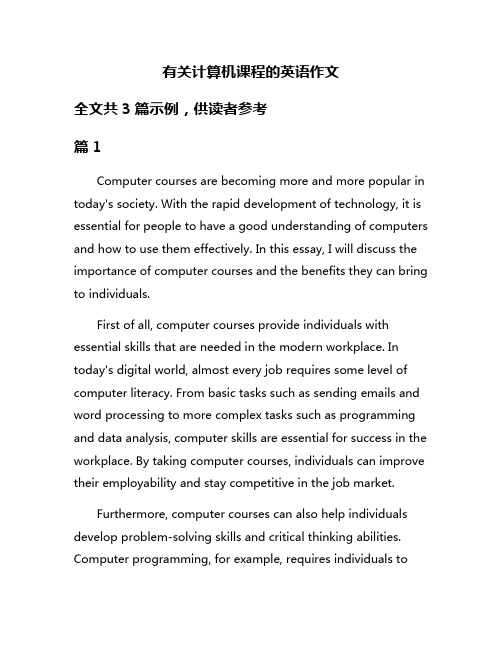
有关计算机课程的英语作文全文共3篇示例,供读者参考篇1Computer courses are becoming more and more popular in today's society. With the rapid development of technology, it is essential for people to have a good understanding of computers and how to use them effectively. In this essay, I will discuss the importance of computer courses and the benefits they can bring to individuals.First of all, computer courses provide individuals with essential skills that are needed in the modern workplace. In today's digital world, almost every job requires some level of computer literacy. From basic tasks such as sending emails and word processing to more complex tasks such as programming and data analysis, computer skills are essential for success in the workplace. By taking computer courses, individuals can improve their employability and stay competitive in the job market.Furthermore, computer courses can also help individuals develop problem-solving skills and critical thinking abilities. Computer programming, for example, requires individuals tothink logically and creatively to solve complex problems. By learning how to code, individuals can enhance theirproblem-solving skills and improve their ability to think critically. These skills are not only valuable in the field of computer science but also in other areas of life.In addition, computer courses can help individuals stayup-to-date with the latest technology trends. Technology is constantly evolving, and new innovations are being introduced all the time. By taking computer courses, individuals can stay informed about the latest advancements in technology and learn how to adapt to new technologies quickly. This can give them a competitive edge in the job market and ensure that they are prepared for the future.Overall, computer courses are essential for individuals who want to succeed in today's digital world. They provide individuals with essential skills for the workplace, help them develop problem-solving abilities, and keep them up-to-date with the latest technology trends. If you want to stay competitive in the job market and excel in your career, taking computer courses is a great way to achieve your goals.篇2Title: The Importance of Computer CoursesWith the rapid advancement of technology, computer courses have become increasingly important in today's world. From basic computer literacy to more advanced programming and coding skills, these courses serve as the foundation for understanding and utilizing technology in various industries and fields.One of the primary benefits of taking computer courses is gaining essential skills that are highly sought after in the job market. With the digital transformation of many industries, employers are looking for candidates with strong computer skills to help them navigate and innovate in this fast-paced environment. Whether it's creating spreadsheets, managing databases, or developing software, computer courses provide the necessary tools to excel in a technology-driven workplace.Moreover, learning computer skills can open up a multitude of career opportunities. From software development to data analysis to cybersecurity, the possibilities are endless for individuals with strong computer skills. With the right training and education, one can pursue a fulfilling and well-paying career in the tech industry, which continues to grow and evolve at a rapid pace.In addition to career prospects, computer courses also enhance problem-solving abilities and critical thinking skills. By studying computer science and programming, students learn how to break down complex problems into smaller, more manageable parts and develop logical solutions. These analytical skills are not only valuable in the field of technology but can be applied to various aspects of life, from decision-making to creative problem-solving.Furthermore, computer courses can help individuals stay relevant in an increasingly digital world. With the rise of artificial intelligence, big data, and cloud computing, it is more important than ever to have a basic understanding of how computers work and communicate. By learning about algorithms, coding languages, and networking, individuals can better understand and adapt to the latest technological trends and advancements.In conclusion, computer courses are essential in today's digital age for a variety of reasons. They provide valuable skills for the job market, open up diverse career opportunities, enhance problem-solving abilities, and help individuals stay relevant in an ever-changing technological landscape. Whether you are a student looking to build a foundation in technology ora professional seeking to upgrade your skills, computer courses are a valuable investment in your future success.篇3Computer science has become an essential part of the modern education system. It covers a wide range of topics from basic programming to advanced artificial intelligence. In today's digital era, having a solid understanding of computer science is crucial for students to thrive in various industries.Computer science courses usually start with the basics of programming languages such as Python, Java, or C++. Students learn how to write code, debug programs, and develop algorithms to solve problems. As they progress, they delve into more complex topics like data structures, algorithms, and database management. These courses provide students with the necessary skills to tackle real-world challenges and innovate in technology.One of the key benefits of taking computer science courses is the development of problem-solving skills. Programming requires logical thinking and creativity to come up with efficient solutions. Students learn how to break down complex problems into smaller, manageable tasks and devise algorithms to tackleeach of them. These problem-solving skills are transferable to other areas of study and can be applied in various fields.Furthermore, computer science courses allow students to explore different areas of specialization. They can choose to focus on software development, artificial intelligence, cybersecurity, or web development, depending on their interests and career goals. This flexibility enables students to tailor their education to suit their aspirations and develop expertise in specific domains.In addition to technical skills, computer science courses also emphasize teamwork and collaboration. Many projects require students to work in groups to solve a problem or develop a software application. This collaborative environment teaches students how to communicate effectively, delegate tasks, and leverage each other's strengths to achieve a common goal. These soft skills are invaluable in the workplace and prepare students for successful careers in the tech industry.Overall, computer science courses play a crucial role in shaping the future of education and technology. By equipping students with essential skills like programming, problem-solving, and collaboration, these courses prepare them for the challenges of the digital age and empower them to make a meaningfulimpact in the world. Whether students pursue a career in computer science or not, the skills they acquire in these courses will undoubtedly benefit them in their academic and professional endeavors.。
计算机科学的前沿技术与研究领域

计算机科学的前沿技术与研究领域在当今科技迅猛发展的时代,计算机科学作为一门重要的学科,涉及了众多的前沿技术与研究领域。
本文将围绕此主题展开探讨,并带您一同了解计算机科学领域中的一些新兴技术和研究方向。
一、人工智能与机器学习人工智能(Artificial Intelligence,AI)是计算机科学领域中备受关注的前沿技术之一。
人工智能的核心在于使计算机具备类似人类的思维和智能,从而实现自主的学习和决策能力。
机器学习(Machine Learning)则是人工智能的重要支撑,通过数据对计算机进行训练和优化,使其能够根据经验不断改进自身的性能。
机器学习在图像和语音识别、自然语言处理、智能推荐系统等领域取得了重大突破,成为了计算机科学领域的研究热点。
二、大数据与数据挖掘随着互联网的普及和信息技术的飞速发展,大数据成为了一种重要的资产。
大数据(Big Data)是对巨大数据集的存储、处理和分析,从中获取有价值的信息和洞察。
数据挖掘(Data Mining)则是通过算法和模型,从大数据中挖掘出隐藏的模式、关联和规律。
大数据和数据挖掘应用于商业智能、金融风控、医疗健康等领域,为决策提供了强有力的支持。
三、云计算与边缘计算云计算(Cloud Computing)是近年来快速发展的一项技术,它借助互联网和虚拟化技术,提供了一种按需使用计算资源的模式。
通过将计算、存储和应用程序等服务部署在云端,用户可以灵活、高效地进行计算任务和数据存储。
而边缘计算(Edge Computing)则是一种将计算和存储推向网络边缘的新模式。
边缘计算将数据处理和分析移至接近数据源的边缘设备,可以减少数据传输的延迟和带宽的消耗,更适合物联网、智能交通等场景。
四、物联网与嵌入式系统物联网(Internet of Things,IoT)是指将各种物理设备与互联网连接,实现设备之间的智能互联和智能控制的技术。
物联网的核心是感知、通信和应用三个层次,通过传感器、通信技术和数据处理,将现实世界的物体与互联网进行有机结合。
计算机课程介绍英语作文
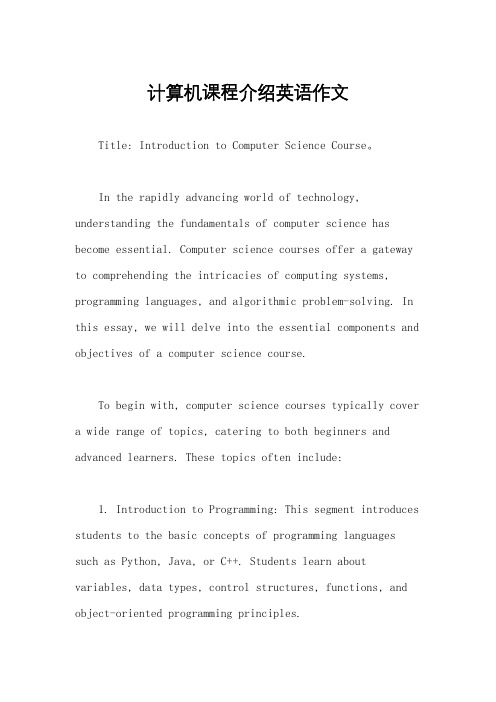
计算机课程介绍英语作文Title: Introduction to Computer Science Course。
In the rapidly advancing world of technology, understanding the fundamentals of computer science has become essential. Computer science courses offer a gateway to comprehending the intricacies of computing systems, programming languages, and algorithmic problem-solving. In this essay, we will delve into the essential components and objectives of a computer science course.To begin with, computer science courses typically cover a wide range of topics, catering to both beginners and advanced learners. These topics often include:1. Introduction to Programming: This segment introduces students to the basic concepts of programming languages such as Python, Java, or C++. Students learn about variables, data types, control structures, functions, and object-oriented programming principles.2. Data Structures and Algorithms: Understanding data structures and algorithms is crucial for developingefficient software solutions. Students explore various data structures like arrays, linked lists, stacks, queues, trees, and graphs, along with algorithmic techniques like searching, sorting, and dynamic programming.3. Computer Architecture: This aspect of the course delves into the hardware components of a computer system, including the CPU, memory, storage devices, andinput/output systems. Students learn about the organization and operation of these components, as well as concepts like machine instructions, assembly language, and digital logic.4. Operating Systems: Operating systems serve as the bridge between software and hardware, managing system resources and providing a user interface. Students studythe principles of operating system design, process management, memory management, file systems, and system security.5. Databases: Databases are integral to storing, retrieving, and managing data in various applications. Students learn about relational database concepts, SQL (Structured Query Language), database design, normalization, and transaction management.6. Software Engineering: Software engineeringprinciples guide the systematic development of software products. Students explore software development methodologies, requirements engineering, software design, testing, debugging, and maintenance.7. Artificial Intelligence and Machine Learning: With the rise of AI and machine learning technologies, many computer science courses include introductory modules on these topics. Students gain insights into machine learning algorithms, neural networks, natural language processing, and applications of AI in various domains.In addition to theoretical concepts, computer science courses often incorporate practical exercises, programming assignments, and projects to reinforce learning outcomes.Hands-on experience is crucial for students to apply theoretical knowledge to real-world problems, develop problem-solving skills, and enhance their programming proficiency.Furthermore, computer science courses aim to cultivate critical thinking, creativity, and collaboration among students. Through group projects, discussions, and presentations, students learn to communicate effectively, work in teams, and approach complex problems from multiple perspectives.In conclusion, a computer science course serves as a comprehensive introduction to the principles, theories, and applications of computing. By equipping students with foundational knowledge and practical skills, these courses prepare them for careers in software development, data analysis, cybersecurity, artificial intelligence, and various other fields where computer science plays a pivotal role in innovation and advancement.。
赞扬中国科技发展英语作文

China has made remarkable strides in the field of science and technology over the past few decades,transforming itself into a global powerhouse in innovation.The progress is evident in various sectors,from space exploration to telecommunications,and from renewable energy to artificial intelligence.Space Exploration:Chinas achievements in space exploration are commendable.The country has successfully launched numerous satellites and manned space missions.Notably,the Change lunar exploration program has made significant contributions to our understanding of the moon.The landing of the Change4probe on the far side of the moon was a historic feat,marking the firstever soft landing on that side.Telecommunications:In the realm of telecommunications,China has become a leader in5G technology.The country has invested heavily in the development and deployment of5G networks,which promise faster internet speeds and improved connectivity.This advancement is expected to revolutionize industries such as healthcare,transportation,and entertainment.Renewable Energy:Chinas commitment to renewable energy is evident in its massive investments in solar and wind power.The country is now the worlds largest producer of solar panels and has set ambitious targets for increasing its renewable energy capacity.This shift towards cleaner energy sources is crucial for combating climate change and ensuring sustainable development.Artificial Intelligence:China has also emerged as a key player in the field of artificial intelligence AI.The government has outlined a strategic plan to become a world leader in AI by2030. Chinese companies are at the forefront of AI research and development,with applications ranging from facial recognition technology to autonomous vehicles.HighSpeed Rail:The development of highspeed rail in China is another testament to its technological prowess.The country boasts the worlds largest highspeed rail network,connecting cities across the nation and facilitating faster and more efficient travel.Innovation Ecosystem:Chinas innovation ecosystem is thriving,with a strong emphasis on research and development.The country has numerous research institutions and universities that are dedicated to advancing scientific knowledge and fostering a culture of innovation.International Collaboration:Chinas approach to international collaboration in science and technology is commendable. The country actively participates in global scientific projects and shares its expertise with the international community,contributing to the collective advancement of human knowledge.In conclusion,Chinas rapid development in science and technology is a testament to its commitment to innovation and progress.The countrys achievements have not only benefited its own citizens but have also contributed to the global advancement of various scientific and technological fields.As China continues to push the boundaries of what is possible,the world can look forward to more groundbreaking discoveries and innovations.。
计算机网络简介英语作文
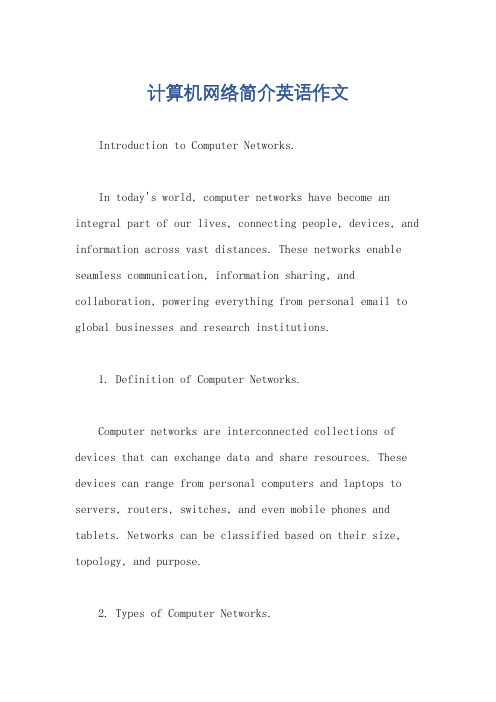
计算机网络简介英语作文Introduction to Computer Networks.In today's world, computer networks have become an integral part of our lives, connecting people, devices, and information across vast distances. These networks enable seamless communication, information sharing, and collaboration, powering everything from personal email to global businesses and research institutions.1. Definition of Computer Networks.Computer networks are interconnected collections of devices that can exchange data and share resources. These devices can range from personal computers and laptops to servers, routers, switches, and even mobile phones and tablets. Networks can be classified based on their size, topology, and purpose.2. Types of Computer Networks.Local Area Networks (LANs): These are networks that cover a small geographical area, such as an office building or a school campus. LANs typically connect computers and devices within a close proximity, enabling fast andefficient data transfer.Wide Area Networks (WANs): WANs span a much larger geographical area, connecting LANs or other networks across cities, states, or even countries. The internet is an example of a global WAN.Metropolitan Area Networks (MANs): These networkscover a geographical area larger than a LAN but smallerthan a WAN, typically connecting multiple buildings or locations within a city or metropolitan region.Personal Area Networks (PANs): PANs connect devices within a personal space, such as a room or on a person's body. They are commonly used for wireless communication between devices like smartphones, headphones, and wearables.3. Components of Computer Networks.Hardware: This includes devices like computers, routers, switches, servers, and cables that form the physical infrastructure of the network.Software: Network software manages and controls the flow of data, enabling devices to communicate with each other effectively.Protocols: Protocols define the rules and formats for data communication on the network. They ensure that devices can understand and interpret the information being transmitted.4. Functions of Computer Networks.Data Communication: Networks enable the transmission of data between devices, allowing users to send and receive emails, access websites, or share files.Resource Sharing: Networks allow devices to access andshare resources like printers, scanners, and servers.Distributed Processing: By dividing tasks between multiple devices, networks can improve processing speed and efficiency.Information Retrieval: Networks provide access to vast repositories of information, enabling users to search and retrieve information from various sources.5. Technologies Used in Computer Networks.Wired vs. Wireless: Networks can be wired, using cables to connect devices, or wireless, using radio waves for communication. Wireless networks, such as Wi-Fi and Bluetooth, provide greater flexibility and convenience.Networking Protocols: Protocols like TCP/IP, HTTP, SMTP, and FTP govern how devices communicate with each other on the network.Networking Hardware: Routers, switches, servers, andfirewalls are essential hardware components that enable network connectivity, manage traffic, and provide security.6. Security Considerations in Computer Networks.With the increasing interconnectedness of computer networks, security has become a paramount concern. Measures like firewalls, antivirus software, and encryption techniques are used to protect networks from unauthorized access, data breaches, and malicious attacks.Conclusion.Computer networks have revolutionized the way we live and work, connecting people and resources across the globe. Understanding the basics of computer networks is crucial in today's interconnected world, as it enables us to leverage their power and address the challenges posed by ever-evolving technologies and security threats.。
加入计算机社团的条件和好处英语作文
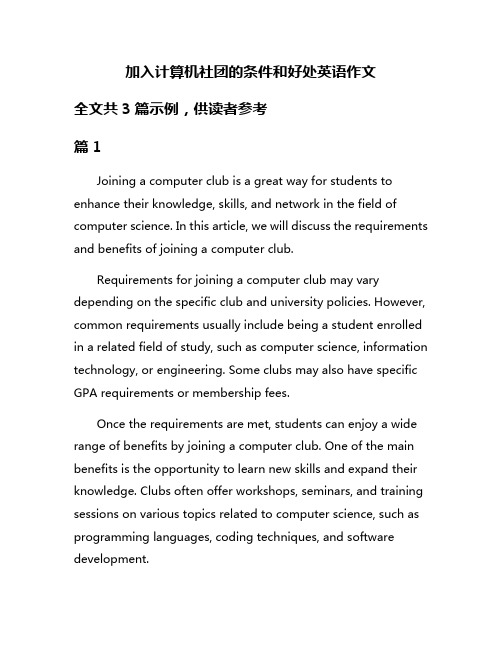
加入计算机社团的条件和好处英语作文全文共3篇示例,供读者参考篇1Joining a computer club is a great way for students to enhance their knowledge, skills, and network in the field of computer science. In this article, we will discuss the requirements and benefits of joining a computer club.Requirements for joining a computer club may vary depending on the specific club and university policies. However, common requirements usually include being a student enrolled in a related field of study, such as computer science, information technology, or engineering. Some clubs may also have specific GPA requirements or membership fees.Once the requirements are met, students can enjoy a wide range of benefits by joining a computer club. One of the main benefits is the opportunity to learn new skills and expand their knowledge. Clubs often offer workshops, seminars, and training sessions on various topics related to computer science, such as programming languages, coding techniques, and software development.Furthermore, joining a computer club allows students to gain practical experience through hands-on projects and activities. Working on group projects, participating in coding competitions, and attending hackathons are great ways for students to apply their knowledge in real-world scenarios and build their portfolio.In addition to skill development, being a part of a computer club provides students with valuable networking opportunities. By interacting with fellow members, alumni, and industry professionals, students can forge connections that may lead to internships, job opportunities, or collaborations on research projects.Moreover, being a member of a computer club can enhance a student's resume and set them apart from other candidates when applying for jobs or graduate programs. Employers and universities often look for candidates who are actively involved in extracurricular activities and show a passion for their field of study.Lastly, joining a computer club can also help students develop teamwork and leadership skills, as they collaborate with peers, organize events, and take on leadership roles within the club.In conclusion, joining a computer club can benefit students in many ways, from skill development and networking opportunities to resume enhancement and personal growth. Students interested in computer science should consider joining a club to take advantage of these benefits and enrich their academic experience.篇2Joining a computer society at school is a great way for students to enhance their computer skills, learn new techniques, and connect with like-minded individuals who share their passion for technology. In this article, we will discuss the conditions for joining a computer society and the benefits that come with being a member.Conditions for Joining a Computer Society:1. Interest in Computers: The most important condition for joining a computer society is to have a genuine interest in computers and technology. Members should be passionate about learning and improving their skills in this field.2. Willingness to Learn: Being part of a computer society requires a willingness to learn new things, collaborate with others, and explore different aspects of computer science.Members should be open to trying out new ideas, attending workshops, and participating in group projects.3. Dedication and Commitment: To make the most out of being a member of a computer society, students should be dedicated and committed to attending meetings, completing tasks, and contributing to the society's activities. This will not only benefit the individual but also the society as a whole.4. Positive Attitude: A positive attitude is key to creating a supportive and encouraging environment within the computer society. Members should be respectful, cooperative, and willing to help others when needed.Benefits of Joining a Computer Society:1. Skill Development: Being part of a computer society provides students with opportunities to enhance their computer skills, learn new programming languages, and gain practical experience in software development. This can be beneficial for academic and career purposes.2. Networking Opportunities: Joining a computer society allows students to connect with peers, mentors, and professionals in the tech industry. Networking can lead to jobcontacts, internships, and valuable connections that can help students advance in their careers.3. Collaboration and Teamwork: Computer societies often involve group projects, hackathons, and coding competitions that require teamwork and collaboration. By working with others, students can improve their communication skills,problem-solving abilities, and project management skills.4. Workshops and Events: Computer societies frequently organize workshops, seminars, and tech talks that cover a wide range of topics in computer science and technology. These events provide valuable information, insights, and inspiration for students who are eager to learn and stay updated on the latest trends in the industry.5. Personal Growth: Joining a computer society can also contribute to personal growth by fostering creativity, critical thinking, and self-confidence. Students can push themselves out of their comfort zones, take on new challenges, and develop a sense of achievement as they progress in their computer science journey.In conclusion, joining a computer society can be a rewarding experience for students who are passionate about computers and technology. By meeting the conditions for joining andactively participating in the society's activities, students can reap the benefits of skill development, networking opportunities, collaboration, workshops, and personal growth. Ultimately, being part of a computer society can help students build a strong foundation for a successful career in the tech industry.篇3Joining a computer club is a great opportunity for individuals who are passionate about technology and looking to expand their knowledge and skills in the field of computing. In this article, we will discuss the requirements for joining a computer club and the benefits that come with being a part of such an organization.To join a computer club, individuals typically need to have an interest in computers and technology. Most clubs welcome members of all skill levels, from beginners to experts, so there is usually no specific technical knowledge required. However, a willingness to learn and engage with the material is essential. Some clubs may also have a membership fee or require members to attend regular meetings and events.There are numerous benefits to joining a computer club. Firstly, being a part of a club allows individuals to meetlike-minded people who share their interests. This can lead to friendships and networking opportunities, both within the club and in the wider tech community. Club members can also benefit from access to resources such as workshops, training sessions, and guest speakers, which can help them deepen their knowledge and skills in computing.Additionally, being a member of a computer club can provide valuable hands-on experience with different technologies and programming languages. Many clubs host coding competitions, hackathons, and other events that allow members to work on real-world projects and showcase their skills. These experiences can be valuable for individuals looking to build their portfolio and gain practical experience in the field.Furthermore, joining a computer club can help individuals stay up-to-date with the latest trends and developments in the tech industry. Club members often have access to newsletters, forums, and other resources that provide updates on new technologies, software updates, and job opportunities. This can be especially valuable for students or professionals looking to advance their careers in the tech field.In conclusion, joining a computer club is a rewarding experience that can benefit individuals in many ways. Whetheryou are a beginner looking to learn more about computers or an experienced professional looking to expand your skills, being a part of a computer club can provide you with a supportive community, valuable resources, and opportunities for growth and learning. If you are passionate about technology and eager to connect with others who share your interests, consider joining a computer club today.。
计算机常用英文用语

计算机常用英文用语Introduction:Computing and information technology play an indispensable role in our daily lives. As technology continues to advance, it is important to be familiar with the commonly used English terms in the field of computer science. This article aims to provide a comprehensive guide to frequently used computer-related English vocabulary, covering various aspects of computing terminology.1. Hardware Terminology:1.1 Central Processing Unit (CPU) - The CPU is the "brain" of a computer, responsible for executing instructions and processing data.1.2 Random-Access Memory (RAM) - RAM is the temporary storage space where data and instructions are temporarily stored while the computer is running.1.3 Hard Disk Drive (HDD) - The HDD is the primary storage device ofa computer, used to store and retrieve digital data.1.4 Graphics Processing Unit (GPU) - The GPU is responsible for rendering and displaying images, videos, and graphics on a computer screen.1.5 Motherboard - The main circuit board of a computer that connects and facilitates communication among various hardware components.2. Software Terminology:2.1 Operating System (OS) - The OS is the software that manages computer hardware resources and provides services for computer programs.2.2 Application - An application, often referred to as "app," is a software program designed to perform specific tasks or functions.2.3 User Interface (UI) - The UI is the part of a software or website that allows users to interact with it. It includes menus, buttons, and graphical elements.2.4 Debugger - A debugger is a software tool used by programmers to locate and fix errors or bugs in computer programs.2.5 Database - A structured collection of data that is organized and accessible by various software applications.3. Networking Terminology:3.1 Internet Protocol (IP) - IP is the set of rules that govern how data is sent and received over the internet.3.2 Router - A router is a networking device that forwards data packets between computer networks. It acts as a traffic director on the internet.3.3 Firewall - A firewall is a network security device that monitors and controls incoming and outgoing network traffic, protecting a network from unauthorized access.3.4 Bandwidth - Bandwidth refers to the maximum amount of data that can be transmitted over a network in a given time period.3.5 Wi-Fi - Wi-Fi is a wireless networking technology that allows devices to connect to the internet or other networks without using physical wired connections.4. Programming Terminology:4.1 Variable - A variable is a named storage location in memory used to store data values that can be changed during the execution of a program.4.2 Loop - A loop is a programming construct that repeats a specific block of code until a condition is met or a certain number of iterations are completed.4.3 Function - A function is a self-contained block of reusable code that performs a specific task. It usually takes input parameters and returns output values.4.4 Compiler - A compiler is a software tool that translates source code written in a programming language into machine code that can be executed by a computer.4.5 Algorithm - An algorithm is a step-by-step procedure or formula for solving a specific problem or achieving a specific outcome in programming.5. Security Terminology:5.1 Encryption - Encryption is the process of converting data into a coded form to prevent unauthorized access or tampering.5.2 Authentication - Authentication is the process of verifying the identity of a user or system, typically through the use of passwords, biometrics, or digital certificates.5.3 Malware - Malware refers to malicious software, such as viruses, worms, or Trojan horses, designed to damage, disrupt, or gain unauthorized access to computer systems.5.4 Phishing - Phishing is a type of cyber-attack where attackers masquerade as legitimate entities to deceive individuals into revealing sensitive information, such as passwords or credit card details.5.5 Firewall - A firewall is a network security device that monitors and controls incoming and outgoing network traffic, protecting a network from unauthorized access.Conclusion:In today's digital age, having a solid understanding of computer-related English vocabulary is crucial for effective communication and collaboration in the field of computing and information technology. This article has provided a comprehensive overview of commonly used computer terms across various aspects, including hardware, software, networking, programming, and security. By familiarizing oneself with these terms, individuals can enhance their ability to navigate the ever-evolving world of technology.。
计算机为我们打开了眼界英语作文

计算机为我们打开了眼界英语作文The World Unfolded by Computers.Computers, the electronic devices that have revolutionized our world, have opened our eyes to a vast and ever-expanding universe of knowledge, information, and possibilities. From the earliest days of their inception, computers have beeninstruments of exploration, education, and entertainment, providing us with new perspectives on the world and our place within it.In the realm of education, computers have broken down barriers and made knowledge accessible to all. Online learning platforms have enabled students from diverse backgrounds and locations to access the same high-quality educational resources. Whether it's a lecture from a top university, an interactive simulation, or a virtual reality experience, computers have made learning more engaging, interactive, and inclusive. They have empowered individuals to pursue their passions and interests, regardless of theirgeographical location or socioeconomic status.In the field of exploration, computers have enabled usto reach beyond the limits of our physical world. From mapping the depths of the ocean to studying the distant reaches of space, computers have provided the computational power and analytical tools necessary to process vast amounts of data and make sense of the unknown. They have allowed us to peer into the microcosmos of atoms and molecules, revealing the secrets of life and matter at its most fundamental level.In the world of entertainment, computers have transformed the way we consume and create art. Digitalmedia has blurred the lines between reality and imagination, enabling artists to create visually stunning works of art that were previously unimaginable. From animated films to virtual reality experiences, computers have provided a medium for artistic expression and storytelling that isboth immersive and interactive.Moreover, computers have facilitated globalcommunication and collaboration. The internet, a network of computers connected worldwide, has made it possible for people from different cultures and backgrounds to communicate and share ideas instantly. Social media platforms have allowed us to connect with friends and family, stay updated with news and events, and share our own stories and experiences with the world. Computers have also enabled remote work and collaboration, breaking down geographical barriers and allowing teams to work together effectively despite being physically apart.Beyond these obvious applications, computers have also had a profound impact on our cognitive abilities and ways of thinking. They have taught us to think critically, solve problems analytically, and adapt to changing situations flexibly. They have given us the tools to analyze vast amounts of data, make informed decisions, and innovate in ways that were previously impossible.In conclusion, computers have opened our eyes to a world that is vaster, more complex, and more interconnected than we could have imagined. They have empowered us toexplore, learn, create, and connect in ways that were previously unimaginable. As we continue to harness the power of computers and push the boundaries of technology, the opportunities and possibilities that lie ahead are truly limitless.。
计算机科学中的深层神经网络应用

计算机科学中的深层神经网络应用深层神经网络(Deep Neural Networks,DNNs)是目前计算机科学领域中最为热门的研究方向之一。
该技术在计算机视觉、语音识别等多个领域有着广泛的应用。
随着深度学习模型的不断优化和数据规模的增加,深层神经网络方法在各个领域的应用逐渐成熟。
在本文中我们将介绍深层神经网络在计算机视觉和自然语言处理领域的应用,以及其在智能交通、智能家居、智能医疗等领域的前景。
1. 计算机视觉领域中的应用在计算机视觉领域,深层神经网络已经成为了基本的工具之一。
1998年,Yann LeCun提出了一个基于深度卷积神经网络的手写数字识别系统,该系统成为了深度学习的催化剂。
现在,深度卷积神经网络在图像识别、目标检测、人脸识别、图像搜索、图像分割等领域有着广泛的应用。
深度卷积神经网络的应用主要基于以下几个方面:(1)特征提取:深度卷积神经网络通过多层卷积层和池化层实现多尺度特征提取,大大提升了图像的表达能力。
(2)分类:深度卷积神经网络通过softmax函数进行分类,将图像分为多个类别。
(3)物体检测:深度卷积神经网络可以对物体进行多类别的定位和识别,例如当前非常流行的Faster R-CNN算法、YOLO算法等。
(4)图像分割:深度卷积神经网络通过将图像分割为不同的区域实现像素级别的图像分割,例如SegNet算法、U-Net算法等。
2. 自然语言处理领域中的应用在自然语言处理领域,深度学习中的循环神经网络和卷积神经网络等模型也已成功应用于许多任务。
例如,语言模型、文本分类、命名实体识别、机器翻译等。
(1)语言模型:深度学习模型可以通过学习大量语料库中的信息来预测下一个词或者下一个句子,有助于提高机器翻译、情感分析等应用的准确性。
(2)文本分类:深度学习模型在文本分类中扮演着重要角色。
它们可以通过学习输入文本的表示来分类不同的文本主题或者意图。
(3)命名实体识别:命名实体识别是指从文本中抽取出专有名词和实体。
计算机科学的5个前沿研究方向

计算机科学的5个前沿研究方向计算机科学是一个发展迅速的领域,不断涌现出新的前沿研究方向。
本文将介绍计算机科学的五个前沿研究方向,即人工智能、大数据、物联网、区块链和量子计算。
一、人工智能人工智能是计算机领域最热门的研究方向之一。
它涉及了计算机视觉、自然语言处理、深度学习和机器人等众多领域。
目前,人工智能已经在图像识别、语音识别、自然语言生成等方面取得了很大的进展。
未来,人工智能将在医疗、金融、交通等产业中得到广泛应用。
二、大数据大数据是指规模巨大、难以处理并且需要高度并行化处理的数据集。
随着互联网、物联网等新兴技术的迅速普及,大数据变得越来越重要。
目前,大数据已经应用于市场营销、人工智能、金融等领域,并取得了显著成果。
未来,大数据将会在医疗、智慧城市等领域得到应用。
三、物联网物联网是指通过互联网连接和管理各种物品,从而构成一个庞大的信息网络。
随着物联网技术的发展,越来越多的设备可以实现智能化,从而使得生活变得更加便利。
未来,物联网将进一步渗透到生活的方方面面,使得城市、家庭和工作更加智能化。
四、区块链区块链是一种通过分布式数据库记录交易的技术。
相比于传统的金融交易方式,区块链技术能够更加安全、便捷地记录交易信息。
未来,区块链技术将应用于金融、物流、版权保护等多个领域,实现数字化和智能化的管理。
五、量子计算量子计算是一种基于量子力学原理的计算模式。
与传统计算机相比,量子计算机在处理大量数据时更加高效。
未来,量子计算机将有可能取代传统计算机,推动大规模基因组解析、复杂的系统优化、人工智能等科学领域的发展。
综上所述,人工智能、大数据、物联网、区块链和量子计算是计算机科学的五个前沿研究方向。
这些方向已经对我们的生产和生活产生了深远的影响,未来也将继续为人类的生活和发展带来更多的变化。
计算机社团英语作文
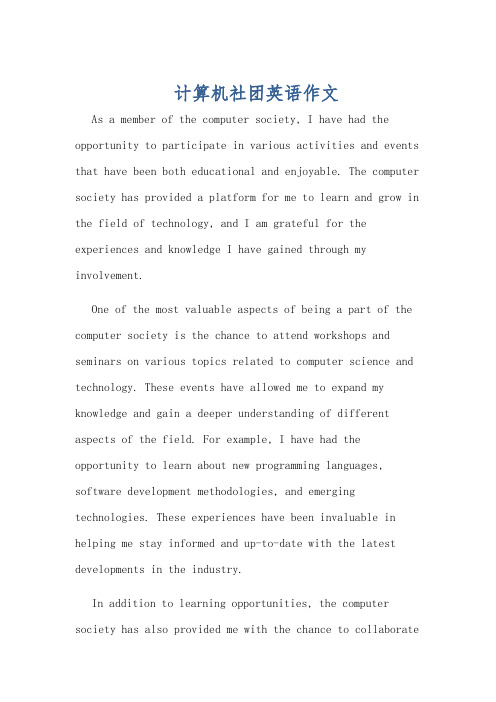
计算机社团英语作文As a member of the computer society, I have had the opportunity to participate in various activities and events that have been both educational and enjoyable. The computer society has provided a platform for me to learn and grow in the field of technology, and I am grateful for the experiences and knowledge I have gained through my involvement.One of the most valuable aspects of being a part of the computer society is the chance to attend workshops and seminars on various topics related to computer science and technology. These events have allowed me to expand my knowledge and gain a deeper understanding of different aspects of the field. For example, I have had the opportunity to learn about new programming languages, software development methodologies, and emerging technologies. These experiences have been invaluable in helping me stay informed and up-to-date with the latest developments in the industry.In addition to learning opportunities, the computer society has also provided me with the chance to collaboratewith like-minded individuals who share a passion for technology. Whether it's working on a group project, participating in a coding competition, or simply engaging in discussions about the latest trends in the tech world, I have found the community within the computer society to be both supportive and inspiring. The connections I have made through the society have not only enriched my social life but have also opened up new opportunities for collaboration and networking in the field of technology.Furthermore, the computer society has allowed me to gain practical experience through various hands-on activities and projects. Whether it's organizing a hackathon, building a prototype, or contributing to an open-source project, I have had the chance to apply my knowledge and skills inreal-world scenarios. These experiences have not only helped me develop practical skills but have also given me a better understanding of the challenges and opportunities within the tech industry.In conclusion, being a part of the computer society has been an enriching and rewarding experience for me. From learning opportunities to networking, and practicalexperience, the society has provided me with a platform to grow and thrive in the field of technology. I am gratefulfor the support and opportunities I have received throughmy involvement, and I look forward to continuing my journey as a member of the computer society.身为计算机社团的一员,我有机会参与各种教育性和有趣的活动。
计算机科技英语短文作文

计算机科技英语短文作文The Importance of Computer Science in Today's World。
In today's modern world, computer science plays a crucial role in almost every aspect of our lives. From the way we communicate and work to the way we access information and entertain ourselves, computer science has revolutionized the way we live. In this essay, we will explore the importance of computer science and its impact on our society.One of the most significant contributions of computer science is the way it has revolutionized communication. With the advent of the internet and social media, people can now connect with each other instantly, regardless of their location. This has not only made communication more convenient, but it has also opened up new opportunities for collaboration and networking. In addition, computer science has also made it possible for us to access and share information in ways that were unimaginable just a fewdecades ago.Another area where computer science has had a profound impact is in the field of education. With the rise ofonline learning platforms and educational software,students now have access to a wealth of resources that can help them learn and grow. This has not only made education more accessible, but it has also personalized the learning experience for many students. In addition, computer science has also made it possible for educators to track andanalyze student performance, allowing them to tailor their teaching methods to better meet the needs of their students.In the business world, computer science has also had a significant impact. From the way companies manage their operations to the way they reach and engage with customers, computer science has transformed the way business is done. With the rise of e-commerce and digital marketing, companies can now reach a global audience and conduct transactions with ease. In addition, computer science has also made it possible for businesses to streamline their operations and improve efficiency through the use ofautomation and data analysis.Furthermore, computer science has also had a profound impact on the field of healthcare. From the way medical records are stored and accessed to the way diagnoses are made and treatments are administered, computer science has revolutionized the way healthcare is delivered. With the rise of electronic medical records and telemedicine, patients now have access to better and more efficient care. In addition, computer science has also made it possible for researchers to analyze vast amounts of data and develop new treatments and therapies.In conclusion, computer science plays a crucial role in today's world, impacting almost every aspect of our lives. From the way we communicate and learn to the way we do business and receive healthcare, computer science has revolutionized the way we live. As technology continues to advance, the importance of computer science will only continue to grow, shaping the future of our society in profound ways.。
计算机科学的新兴领域

计算机科学的新兴领域计算机科学作为一门相对年轻的学科,正在不断发展和扩展其应用领域。
新兴领域的涌现不仅带来了技术革新,也改变了我们的生活方式和社会结构。
本文将介绍计算机科学的一些新兴领域,探讨其应用和前景。
一、人工智能与机器学习人工智能(Artificial Intelligence,简称AI)和机器学习(Machine Learning)是当前最为热门的计算机科学新兴领域。
人工智能通过仿生学原理,模拟人类智能的思维和决策过程,实现自主学习和自我调整能力。
机器学习则利用大数据和算法,让计算机能够通过数据的学习和统计分析,自动发现规律,并做出预测和决策。
人工智能和机器学习技术的应用广泛,包括智能语音助手、自动驾驶、智能推荐系统等。
这些应用不仅提高了我们的工作效率和生活便利性,也推动了其他行业的创新和发展。
例如,在医疗领域,人工智能辅助诊断技术能够通过大量病历和医学影像数据的学习,辅助医生进行疾病诊断和治疗方案选择。
然而,人工智能和机器学习也面临着一些挑战和问题,例如数据隐私和伦理问题,以及算法的不透明性。
因此,未来需要加强相关法律和伦理规范,确保人工智能和机器学习的应用具有可靠性和公正性。
二、大数据与数据科学随着互联网和移动设备的普及,我们正在进入一个大数据时代。
大数据指的是数据量巨大、类型多样,无法用常规的数据处理方法进行分析和处理的数据集合。
而数据科学则涉及大数据的收集、存储、处理和分析方法。
大数据与数据科学在各个领域的应用都十分广泛。
在商业领域,利用大数据分析,企业能够更好地了解市场需求、消费者行为和产品性能,从而做出更准确的决策。
在医疗领域,大数据分析可以帮助医生进行疾病预测和医院资源管理等。
在城市规划领域,利用大数据分析可以优化城市交通流动、提高资源利用效率等。
然而,大数据和数据科学也面临着数据安全和隐私保护的问题。
随着数据的增长,如何确保数据的安全性和隐私性成为一个紧迫的问题。
因此,加强数据保护的技术研究和法律规范的制定是大数据与数据科学领域的重要课题。
计算机科学中的前沿技术研究与应用

计算机科学中的前沿技术研究与应用计算机科学,是指研究计算机及其实现和应用的科学,是现代科技和信息社会发展的重要基础。
随着科技的不断进步,计算机科学也在不断发展,经历了从一台巨大的机器到身形轻盈的笔记本再到智能移动设备的演变。
同时,计算机科学也在不断推进着前沿技术的研究与应用,下面我们就来探讨一下计算机科学中的前沿技术吧。
人工智能人工智能,英文名为Artificial Intelligence(AI),指计算机系统利用各种技术模拟人类的某些智力行为,或使计算机系统听、说、写、看、学和判断。
近年来,深度学习和机器学习技术的发展,为人工智能应用和产业的发展打下了坚实基础。
目前,人工智能广泛应用于机器识别、语言处理、智能交互、智能制造、智能家居等各领域。
例如,智能语音助手的识别和回答问题,以及智能家居的控制和优化,都离不开人工智能技术的应用。
同时,在医疗健康、金融交易等领域,也有着不可替代的作用。
区块链区块链,英文名为Blockchain,是一种去中心化的数字账本,具有信息不可篡改、去中介化、可追溯等特点。
目前,区块链技术已经广泛应用于金融、物流、医疗等领域。
例如,利用区块链技术可实现医疗信息的共享和可信交换,保障患者隐私,同时也为医疗数据应用提供了保障和便利。
在金融领域中,区块链技术应用可实现多方参与的资金交易和结算,降低交易成本和风险。
当前,区块链技术仍处于快速发展阶段,并有着广阔的应用前景。
云计算云计算,英文名为Cloud Computing,是一种基于网络的计算方式和信息处理模式。
云计算可以满足计算资源的动态扩展,为大型企业、研究机构和互联网应用提供了软硬件和服务资源的便捷共享。
目前,云计算技术在各领域取得了广泛的应用,例如,大数据处理、物联网管理、企业级应用、文化传媒等等。
以国内网络视听平台为例,基于云计算技术,网络电视、音乐服务、游戏娱乐等多种服务能够高质量、高速度地被提供给用户?物联网物联网,英文名为Internet of Things(IoT),是指通过传感器和计算机等技术手段,使得物体能够进行智能化、自我感知、自我识别、自我组织,最终实现智能化互联的过程。
学好计算机英语,高效的方法英语作文

学好计算机英语,高效的方法英语作文Learning computer English is essential for anyone interested in the field of IT. As technology continues to evolve at a rapid pace, having a strong command of English is crucial for effective communication, understanding technical documents, and collaborating with international colleagues. In this article, we will discuss some high-impact methods to efficiently learn computer English.First and foremost, it is important to have a clear learning plan in place. Set specific goals for what you want to achieve with your computer English skills, whether it's improving your reading comprehension of technical articles, enhancing your speaking abilities for presentations, or mastering common IT vocabulary. By having a roadmap in place, you can stay focused and motivated throughout your learning journey.One effective way to learn computer English is through immersion. Surround yourself with English-language resources related to computer science, such as books, websites, podcasts, and online forums. Immerse yourself in this environment as much as possible, and try to use English in your everyday interactions with colleagues and friends. By exposing yourself toEnglish consistently, you will gradually become more comfortable and proficient in using the language.Another key method for improving your computer English skills is through active practice. Engage in activities that require you to use English in a practical way, such as writing technical reports, giving presentations, participating in online discussions, or even teaching others about computer concepts in English. The more you actively use and practice the language, the more you will internalize and retain what you have learned.Furthermore, leveraging technology can enhance your learning experience. There are many online resources available that cater specifically to learning computer English, such as language learning apps, online courses, and virtual tutoring sessions. Take advantage of these tools to supplement your learning and gain a deeper understanding of technical terminology and concepts.In addition, don't underestimate the power of networking and collaboration in your learning journey. JoiningEnglish-speaking IT communities, attending conferences and seminars, or participating in study groups can provide valuable opportunities to practice your language skills in a real-world context. By connecting with peers who share your interests, youcan exchange ideas, seek feedback, and build a supportive network that will help you grow as a computer English learner.Lastly, it is important to maintain a positive and growth mindset throughout your learning process. Learning a new language can be challenging, but with dedication, perseverance, and a willingness to step outside your comfort zone, you can make significant progress in mastering computer English. Celebrate your achievements, learn from your mistakes, and stay curious and open-minded as you continue to expand your language skills.In conclusion, mastering computer English is a valuable asset for anyone working in the field of IT. By following thesehigh-impact methods and staying committed to your learning goals, you can develop the language skills needed to communicate effectively, collaborate with others, and excel in your career. Remember that learning is a lifelong journey, and by investing in your language skills, you are investing in your future success in the digital age.。
英语计算机交流会发言稿

Ladies and Gentlemen,Good morning/afternoon/evening, and welcome to this esteemed computer science and technology exchange conference. It is a great pleasure to be here among such a diverse and innovative group of professionals, students, and enthusiasts. Today, I would like to share my thoughts on the rapidly evolving landscape of computer science and technology, and how we can collectively navigate this exciting future.The Rapid Evolution of Computer ScienceThe field of computer science has come a long way since the first electronic computers were developed in the 1940s. From the humble beginnings of punch cards and vacuum tubes, we have reached a point where computers are an integral part of our daily lives, revolutionizing the way we work, communicate, and live.1. The Digital Revolution: The digital revolution has transformed industries, creating new opportunities and challenges. Today, we are surrounded by smart devices, from smartphones to smart home systems, all powered by sophisticated algorithms and machine learning.2. Quantum Computing: The emergence of quantum computing promises to solve complex problems that are currently beyond the reach of classical computers. This new era of computing could lead to breakthroughs in fields such as cryptography, materials science, and complex system modeling.3. Artificial Intelligence and Machine Learning: AI and ML have become indispensable tools in various sectors, from healthcare to finance. These technologies are not only enhancing efficiency but also enabling new forms of creativity and innovation.The Role of Computer Science in Solving Global ChallengesComputer science has the potential to address some of the most pressing global challenges of our time:1. Climate Change: By analyzing vast amounts of data, computer science can help us better understand climate patterns and develop more effective strategies for mitigation and adaptation.2. Healthcare: From personalized medicine to AI-driven diagnostics, computer science is revolutionizing healthcare, improving patient outcomes, and reducing costs.3. Education: With the rise of online learning platforms and adaptive learning systems, computer science is transforming the way we approach education, making it more accessible and personalized.Collaboration and the Future of Computer ScienceThe future of computer science lies in collaboration across disciplines and borders:1. Interdisciplinary Teams: Solving complex problems requires expertise from various fields. Computer scientists need to work closely with experts in biology, psychology, and economics to develop innovative solutions.2. Global Collaboration: The digital world knows no boundaries. By collaborating with researchers and developers from around the world, we can accelerate innovation and share knowledge.3. Ethical Considerations: As technology advances, it is crucial to address ethical concerns, such as data privacy, algorithmic bias, and the impact of automation on employment.The Role of Education and Lifelong LearningTo keep up with the rapid pace of technological change, education and lifelong learning are key:1. Curriculum Development: Educational institutions must adapt their curricula to reflect the latest advancements in computer science and technology.2. Mentorship and Networking: Providing opportunities for mentorship and networking can help young professionals and students build the necessary skills and connections for a successful career.3. Continual Learning: In an ever-changing field, it is essential for professionals to engage in continuous learning, attending workshops, conferences, and participating in online courses.ConclusionIn conclusion, the intersection of computer science and technology presents both immense opportunities and challenges. As we navigate this exciting future, it is crucial to embrace collaboration, ethical considerations, and the importance of education and lifelong learning. Together, we can harness the power of computer science to create a more connected, efficient, and sustainable world.Thank you for your attention, and I look forward to engaging in a lively discussion with you all. Let us continue to explore the wonders of computer science and its potential to shape our future for the better.Best regards,[Your Name][Your Position][Your Organization]。
- 1、下载文档前请自行甄别文档内容的完整性,平台不提供额外的编辑、内容补充、找答案等附加服务。
- 2、"仅部分预览"的文档,不可在线预览部分如存在完整性等问题,可反馈申请退款(可完整预览的文档不适用该条件!)。
- 3、如文档侵犯您的权益,请联系客服反馈,我们会尽快为您处理(人工客服工作时间:9:00-18:30)。
Collaboration network in science of networks(网络科
学领域科学家合作关系)
数据摘要:
The file NetScience contains a coauthorship network of scientists working on network theory and experiment, as compiled by M. Newman in May 2006. The network was compiled from the bibliographies of two review articles on networks, M.E.J. Newman, SIAM Review 45, 167-256 (2003) and S. Boccaletti et al., Physics Reports 424, 175-308 (2006), with a few additional references added by hand. The version given here contains all components of the network, for a total of 1589 scientists, and not just the largest component of 379 scientists previously published. The network is weighted, with weights assigned as described in M.E.J. Newman, Phys. Rev. E 64, 016132 (2001).
中文关键词:
合作关系,网络,科学家,网络理论,实验,
英文关键词:
coauthorship,network,scientists,network theory,experiment,
数据格式:
TEXT
数据用途:
研究网络结构等
数据详细介绍:
NetScience Collaboration network in science of networks
Dataset NetScience
Description
valued undirected network with 1589 vertices and 2742 edges; author X wrote a joint work with author Y; value is the MEJ Newman weight. Background
Downloaded from M.E.J. Newman's data page
The file NetScience contains a coauthorship network of scientists working on network theory and experiment, as compiled by M. Newman in May 2006. The network was compiled from the bibliographies of two review articles on networks, M.E.J. Newman, SIAM Review 45, 167-256 (2003) and S. Boccaletti et al., Physics Reports 424, 175-308 (2006), with a few additional references added by hand. The version given here contains all components of the network,
for a total of 1589 scientists, and not just the largest component of 379 scientists previously published. The network is weighted, with weights assigned as described in M.E.J. Newman, Phys. Rev. E 64, 016132 (2001).
If you make use of these data, please cite M.E.J. Newman, Finding community structure in networks using the eigenvectors of matrices, Preprint
physics/0605087 (2006).
History
Science compiled by M. Newman in May 2006;
Science.gml by Mark Newman on Sat Jul 22 06:24:59 2006;
3.Transformed into Pajek format by Vladimir Batagelj, March 1, 2007. References
1.M.E.J. Newman (2003): The structure and function of complex networks,
SIAM Review 45, 167-256 .
2.S. Boccaletti et al. (2006); , Complex networks: Structure and dynamics
Physics Reports 424, 175-308.
3.M.E.J. Newman (2006): Finding community structure in networks using
the eigenvectors of matrices, Preprint physics/0605087.
数据预览:
点此下载完整数据集。
